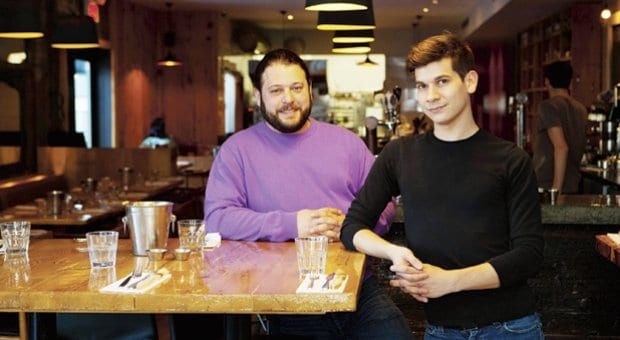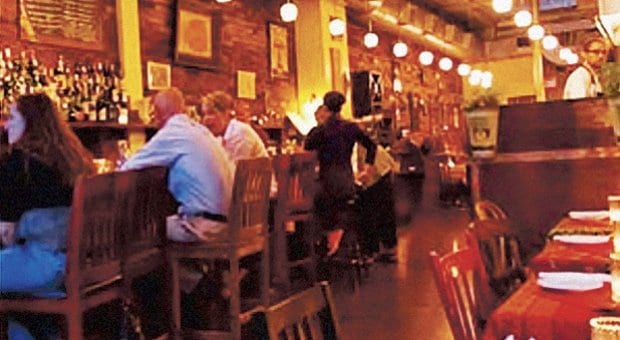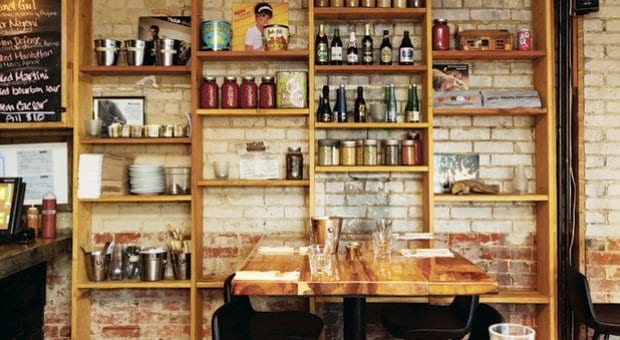
Barque boys: Owner Dave Neinstein with Gerardo Diaz, his manager and sommelier. Credit: Tanja Tiziana

La Palette’s cozy dining room. Credit: Courtesy of La Palette
Barque Smokehouse: 299 Roncesvalles Ave
If you’ve done much travelling south of the border — and I mean really south — you’ve probably tasted Southern barbecue, the impossibly tender pork, beef or chicken that positively melts in your mouth. Mind you, this isn’t the backyard type of grilling we’re accustomed to above the 49th parallel: these joints of meat are cooked for 24 hours or so, until even the toughest old pig becomes delicate and tasty.
Having successfully avoided much of the Deep South’s influence when it comes to things like public lynchings and rampant racism, it’s still a shame that some of their more interesting culinary practices haven’t migrated north. Barbecue restaurants in Toronto are few and far between, but one of the most interesting and successful has to be Barque, a cool little place located in the heart of Roncesvalles.
The owner is Dave Neinstein, a hunky bearded bloke who has brought his own version of barbecue to the city. “I call it authentic southern Ontario barbecue,” Neinstein says. “Which actually doesn’t exist.”
It may not officially exist, but if the crowds flocking to Barque every night are anything to go by, it darn well should. Unlike some Southern barbecue, Neinstein focuses on enhancing the meat’s flavour with a dry rub that goes on before the cooking process, as opposed to the heavy sauces added afterward that one often finds in the States. He blends these spices himself, gearing each batch toward the type and cuts of meat being loaded into the restaurant’s massive smoker. This self-taught chef is quick to point out that his recipes are nearly all the fruits of simple trial and error.
“I’m not a classically trained chef,” says Neinstein, formerly a marketing expert. “When I decided to open this restaurant, I was methodical about it. I went down to a small town in Oklahoma and worked in a barbecue restaurant. Then it was basically me working to get each dish right to my own satisfaction.”
Barque proved a near instant success. Certainly it was helped by the famously loyal residents of Roncie, always eager to support their local independent businesses, but the novelty of delicious barbecue served in a cool urban setting has proven a winner with non-residents as well. Neinstein opened the place with a skeleton crew, taking on most of the kitchen duties himself. Now there’s a staff of 40 or so, specially trained to produce his creations.
“Aside from myself, all of the other chefs are classically trained,” Neinstein says. “So our food is classic pit barbecue meets modern classically trained chef.
“We push the refined barbecue experience. There are no squeeze bottles; we put brushes at every place setting instead. We try to elevate barbecue and include some non-traditional items, such as our beef-cheek-stuffed sushi rice balls.”
Um, what?
Neinstein laughs. “Beef cheeks are amazing. They don’t taste gamey. It’s just like a really tender piece of meat that we smoke, then braise and wrap around sushi rice with a little miso glaze.” And how did he come up with this creation? “I like sushi rice and I like beef cheeks,” he says with a grin. “Simple.”
Another element in raising the posh factor is Barque’s impressive wine list, chosen by the restaurant’s operations manager and certified sommelier Gerardo Diaz.
“I like the way wine can change and enhance a meal,” Diaz says. “And each bottle has its own story, depending on the environment where the grape was grown, the type of season and the growing conditions.”
Diaz has spent most of his professional life working in restaurants and has even tried his hand at creating signature cocktails for Barque’s drinks menu. Among the less successful of these was a summer concoction named after our illustrious mayor. But, as Diaz dryly points out, “Nobody wants the taste of Rob Ford in their mouth.”
Barque also offers fish and vegetarian options and, in keeping with Roncesvalle’s family-centric vibe, welcomes children with open arms. While their parents are enjoying the restaurant’s signature pecan pie with ginger gelato, the kids are offered the chance to decorate their own cookies. There are even toys and games to occupy the little darlings.
“This neighbourhood is all about kids,” Neinstein says. “I love it here. My partner and I have since moved to the area. His kids go to school here, and I’m happy to work here. So it’s important to us that we bring something good to our neighbours.”
La Palette: 492 Queen St W
Like its country of origin, French cuisine is a study in contrasts. Of course, there’s the glossy veneer lent by Parisian sophisticates, but underneath those fancy sauces lurks a whole world of snails, liver and green amphibian amputees. Once North Americans got past the initial squeamishness, these delicacies rightly found their way into our hearts. But there’s one French staple that seems to elude popularity — indeed, that seems to cause havoc whenever it rears its majestic, maned head.
“In English-speaking North America, horse meat is anathema to people,” says Shamez Amlani, owner of La Palette, a popular French bistro in Toronto. “It’s a deep and interesting controversy.”
When Amlani opened his restaurant 13 years ago, the presence of this controversial dish was a secret shared only with select customers, a sort of wink-wink, nudge-nudge that created a cult following.
“Horse wasn’t listed on the menu,” Amlani says. “We would surmise that a table wasn’t going to be squeamish and then let them know that we served it. When we finally came out of the closet, so to speak, it really raised some people’s ire.”
To put it mildly. Animal rights activists and horse lovers picketed La Palette for months, protesting the restaurant’s serving of their friend Flicka and often getting into heated confrontations with the restaurateur. Like any good marketer, Amlani viewed these protests as free publicity.
“It was endless hours of talking and fun,” he says. “They would be out front picketing, and my bar business would actually pick up. I turned it into some crypto-advertising campaign: Free horse tartar during protests! Horse happy hour!”
As the city’s tastes evolved and broadened, La Palette’s reputation for authentic French cuisine grew. There’s still the occasional protest about chowing down on poor Trigger, but it’s lost in a sea of great reviews and customer loyalty. And if Amlani’s establishment has a hint of notoriety about it, the menu is anything but one-note.
“Aside from the horse, there are things here you wouldn’t normally see in a restaurant,” Amlani says. “We have quadruple-A beef steaks from Alberta, and we bring in things like farmed wild boar from Manitoba and muskox from Banks Island in the Northwest Territories. Only the Innu are allowed to hunt it.”
Popular items on the menu are smoked duck hearts, foie gras and, of course, the horse. “The cut that we’re serving is the tenderloin. It’s like the best filet mignon you’ve ever had. It’s like beef but silkier and a little sweeter. We have an entrée called the Quack and Track, which is duck confit served with the horse tenderloin. It’s very popular.”
But one of Amlani’s favourite dishes is also one that perfectly represents his mischievous and infectious sense of humour. “I love the duck neck sausage,” he says impishly. “The neck is used as the sausage casing and then we place a confit duck head on it. You can crack his beak open and eat the cheeks. Watch out — he’s got a tongue!”
Watch a behind-the-scenes video of our photo shoot for the meat issue and check out Daily Xtra for more meaty goodness!

 Why you can trust Xtra
Why you can trust Xtra


